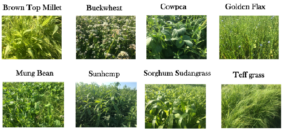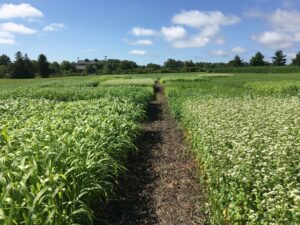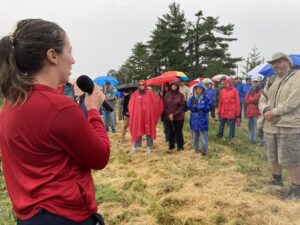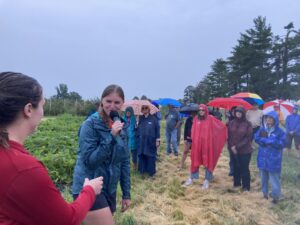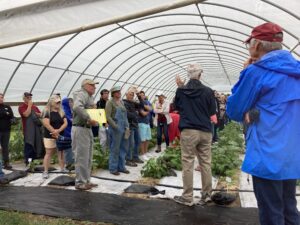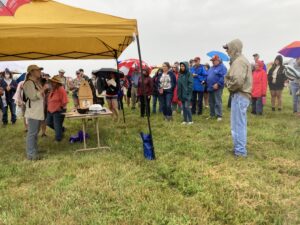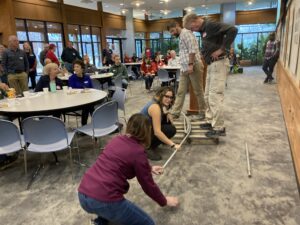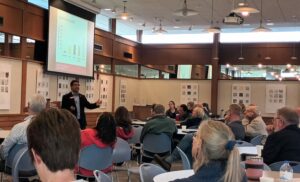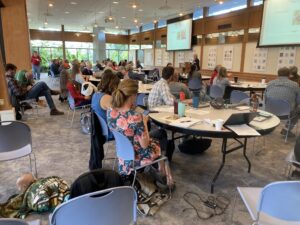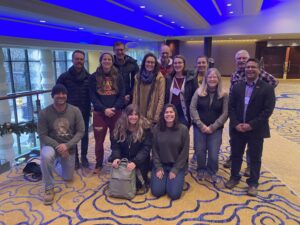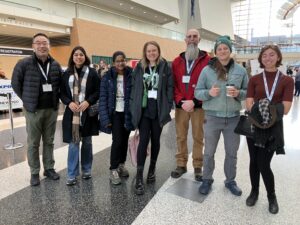Final report for ENC19-180
Project Information
The primary objective of this proposal is to train and educate extension educators, county horticulturists, FFA teachers, local food professionals, food systems working group members, industry and community leaders, and personnel from NRCS and Iowa Department of Agriculture and Land Stewardship on both basic and advanced concepts and applications of sustainable vegetable production. These individuals are often at the forefront disseminating information to commercial vegetable growers, farmer’s market managers, students, food hub coordinators, market gardeners, public, and policy makers. Building capacity in these individuals in the area of soil management, cover cropping, crop rotation, specialized tools and machinery, cultivar/variety selection, pest identification, and disease diagnostics will significantly enhance services they provide to their clients and stakeholders. A long-term outcome of this project would be creation of a workforce comprising who have advance knowledge and understanding of sustainable vegetable production and are better prepared to address stakeholder/grower issues and challenges. Empowering FFA teachers will strengthen agriculture curriculum in the classroom and lead to high school students who have a better understanding of sustainable agriculture. In order to effectively engage participants, the project will organize training workshops, field days, and educational trips to regional vegetable conferences in the north central region. The project will also create an online e-learning course on sustainable vegetable production to reach out to distance learners and multiply the outreach of this project. These activities will provide increased training and learning opportunities to our target audience and enhance their knowledge and understanding of sustainability in vegetable crop production.
Education materials: Program outputs will include survey results (highlighting challenges and obstacles in vegetable cropping systems), educational materials, and resources developed for workshops and online course. An extension bulletin will highlight concepts of sustainable vegetable production, tools available and effective ways of managing a successful vegetable production enterprise.
Vegetable production workshops: We plan to organize six statewide vegetable production workshops that will address key production topics such as cultivar selection, planting schedules, spacing and fertility, pest management, cultural practices, harvesting parameters and schedules, and post-harvest handling. We expect 120 participants a year attending our workshops (15 different participants at each workshop).
e-Learning online course: The online course will reach out to a wider audience in the region. We anticipate several county horticulturists, extension professionals, and high school FFA teachers would enroll for the course. The project will also record presentations made at workshops and upload them on Sustainable Vegetable Production Lab webpage (http://www.extension.iastate.edu/vegetablelab).
Strategic Partnerships: An important aspect of this project is the development of strategic partnerships between extension and government staff, grower organizations, county extension personnel, FFA teachers, and farmers who serve as educators. Such partnerships are critical to build a strong foundation and to leverage more support and funds in local food production. The project also benefits students enrolled in FFA programs through an enriched curriculum that expands on sustainable vegetable production.
Case studies: Workshops and on-site activities will be utilized to develop one-two case studies that could be potentially be used in classrooms at Iowa State University and for the online course. These case studies will enhance student understanding of tools and management strategies growers and extension personnel use in the real world.
Education
The 2020 project year could not implement several programs that were outlined in the proposal due to campus shutdown, restricted activities in the state, and safety concerns for clients, stakeholders, growers, and local food partners. In 2021 and 2022 the project was back on track and conducted in-person workshops, field days, Amish/Mennonite produce walks, listening sessions of the Practical Farmers of Iowa and Iowa Fruit and Vegetable Growers Association, and the in-person professional development trip for the extension staff, regional food systems personnel, FFA teachers, and growers to the Great Lakes Expo, Grand Rapids, MI and Great Plains Growers Conference, St. Joseph, MO.
In 2021 and 2022, the project offered a multi-instructional educational approach which included face-face, online, and hands-on activities. Programs were re-tooled to offer in-person and virtual offerings/format to reach a diverse group of clientele across Iowa and the Midwest region. We utilized services of the ISU Extension and Outreach videography personnel for recording and professional editing of recorded educational videos. The virtual/online methods consisted of webinars, YouTube videos, Zoom discussions, online courses, and virtual field days. The in-person activities comprised of field days, twilight produce walks, and professional development activities.
Education & Outreach Initiatives
1. Educate and train county horticulturists, extension educators, local food coordinators, and field specialists on sustainable vegetable production topics. This online course is designed to provide an introduction to vegetable crops and principles and practices of vegetable crop production. Topics included crop classification; planting methods; crop climatic conditions, physiological growth and development; soil, water, and pest management; organic production; cover cropping; crop rotation; season extension strategies; postharvest handling/management and food safety.
2. Provide latest and up to date information on sustainable production techniques and approaches such cover cropping, conservation tillage, and integrated pest management techniques.
Online Vegetable Production course was offered with the help of The Brenton Center for Agricultural Instruction and Technology Transfer in Spring 2020 and 2022. The course was specially designed for county horticulturists, extension professionals, and high school FFA teachers. Below is the list of individuals who took the course.
| Name | Organization |
| Samuel Genson | ISU Extension and Outreach |
| Joshua Day | Muscatine High School |
| Vanessa Preast | Food Corps |
| Megan Will | Iowa State University Extension and Outreach Dallas County |
| Josephine Stabenow | Cora B. Darling Elementary |
| Dawn Henderson | ISU Extension and Outreach Lyon County |
| Alexandria Clough | Winfield United |
| Shannon Bielicke | ISU Johnson County Extension and Outreach |
| Carol Camp | Iowa State University |
| Pauric Mc Groary | Waypoint Analytical |
| Kenneth Weber | Weber Farms |
| Ed Moreno | Gentle Family Dentists |
| Warren Gall | University of Dubuque |
| Nancy DewLocal | Local Foods |
| Hilary Lanman | ISU Extension and Outreach |
| Aaron Nelson | Working professional |
| Kenny Tietsort | Vegetable Grower, Battle Creek, IA |
- Participants learned about principles and practices of vegetable crop production including the what, where, when and how of growing specific crops.
- In-depth information presented on crop classification; planting methods; crop climatic conditions, physiological growth and development; soil, water, and pest management; organic production; cover cropping; crop rotation; season extension strategies; postharvest handling/management and food safety.
- Participants received detailed information on site selection, identifying nutrient deficiency symptoms, soil fertility approaches, and fertility recommendations
1. Address grower questions regarding integrating summer cover crops in commercial vegetable production
2. Highlight several cover crops in the field and their growth stages so growers feel comfortable utilizing them in their fields
3. Show differences in cover crop growth habits, biomass, and weed suppression properties
4. Demonstration of flail mower for cover crop termination.
A cover crop demonstration study was seeded mid June at the Horticulture Research Station, Ames, IA. The cover crop species included buckwheat, brown top millet , teff grass, sorghum sudangrass, sunn hemp, mung bean, cowpea, and golden flax (Figure 1).
Fig. 1. Cover crop species seeded and view of the entire plot.
The original intent was to organize an in-person cover crop demonstration in July 2020, but due to the pandemic, a virtual cover crop video was developed (https://www.youtube.com/watch?v=KY2MhKspNBc)
- The virtual cover crop field day demonstrated the feasibility of growing some unique cover crops under Iowa growing conditions.
- The virtual field day provided a firsthand assessment of the growth, establishment, and performance of summer cover crops under Iowa weather.
Create instructional YouTube videos for commercial vegetable growers, community garden volunteers, FFA teachers, and extension staff
YouTube videos were created to demonstrate the importance vegetable production tools and techniques. These videos were shared with grower members of the Iowa Fruit and Vegetable Growers Association and Practical Farmers of Iowa. Below are topics that were discussed
- Cabbage worms hiding https://www.youtube.com/watch?v=svZC0niB0qE&t=4s
- Pepper sun scald https://www.youtube.com/watch?v=Z0MdrFfBeaQ
- Lettuce cultivars for Iowa https://www.youtube.com/watch?v=pQ-9PT4JuaM&t=446s
- Leafy greens quick cut harvester https://www.youtube.com/watch?v=tZ50Q4b-Al8&t=177s
- Installation of soil moisture sensors https://www.youtube.com/watch?v=fMKDJdbdoEs)
- Assessing and inter interpreting soil moisture sensors (https://www.youtube.com/watch?v=1h0S4a-jb7c)
- Plastic mulch puller (https://www.youtube.com/watch?v=_ttUb_M9Qkg)
- Compost spreader in vegetable production (https://www.youtube.com/watch?v=PxcDvQUEF6k)
- Iowa Vegetables: Pest management (https://www.youtube.com/watch?v=bHUnFFtuJEU&list=PLzZRnFJ154EJ8qvX1EvEwGvhHUFgDmopm)
- Growers utilized the online videos identify pests
- Viewers were exposed to tools that can optimize and speed up harvesting of leafy greens
- New cultivars of lettuce were demonstrated and explained. This provides growers research-based information that they can implement in their farms
- Videos explained irrigation management approaches which will save growers water and fertilizer
Objectives:
1. Educate and train county horticulturists, extension educators, local food coordinators, and field specialists on IPM tools and strategies in vegetable production
2. Provide latest and up to date information on pest management tools and techniques
3. Conduct needs assessment survey
4. Provide information on resources and services available through ISU Extension and Outreach and other land-grant institutions.
Horticulture Professional Development Workshop – A Horticulture Extension and Outreach professional development workshop was organized September 2021 and October 2022 at the Reiman Gardens, Ames, IA. The event was attended by ISU County horticulturist, extension educator, field specialist, local foods coordinator, and Master Gardener Coordinators. Sixty two participants attended the event. The agenda for the In-Service consisted of presentations from experts on topics that included integrated pest management topics, updates from the field on fruit and vegetable production, insect and disease identification, and status of horticultural crop production in Iowa. In addition several experts were assigned to seven round tables that facilitated 10-15 minute discussion on the following topics: 1. Vegetable production, 2. Fruit production, 3. Organic horticulture, 4. Trees and ornamentals, 5. Insect ID, 6. Plant Diseases, and 7. Plant ID.
1. Educate and train ISU county horticulturists, extension educators, local food coordinators, and field specialists on fruit and vegetable production
2. Provide latest and up to date information on pest management tools and techniques
3. Provide hands on training
1. Provide releavant and up-to-date information on fruit and vegetable crops
2. Highlight sustainable pest management tools and techniques
3. Demonstrate the use of new approaches and tools in fruit and vegetable production
4. Showcase the value of high tunnels
A Fruit and Vegetable Field Day was organized on July 2021, August 2022, and August 2023 which featured research and demonstration projects on fruit and vegetable production for commercial growers, extension personnel, non-profit organizations and Master Gardeners. The event provided an opportunity for attendees to evaluate research and extension projects focusing on high tunnel vegetable production, apple and grape production, IPM tools, cover crops, and soil quality and health. Representatives from USDA FSA office from Des Moines were available to share information about ongoing FSA programs that could assist specialty crop producers. Below is the schedule from the 2023 event
| Time | Topic | Speaker |
| 2:00 PM | Introduction and welcome | Assoc. Dean Kendall Lamkey |
| 2:10 PM | PFI/IFVGA/SARE | Liz Kolbe/Jacqueline/Olivia Hanlon |
| 2:30 PM | Good Earth Student Farm polyculture in high tunnels | Manish Mosalpuri |
| 2:50 PM | Heritage orchard | Olivia Meyer/Brandon Carpenter/Suzanne Slack |
| 3:10 PM | Midwest Apple Improvement Association Orchard | Olivia Meyer/Brandon Carpenter/Suzanne Slack |
| 3:30 PM | Automated irrigation in vegetable systems | Carly Strauser and Ajay Nair |
| 3:50 PM | Honeybee and honey production | Randall Cass |
| 4:15 PM | PIDC: Squash bug management | Zach Schumm and Chelsea Harbach |
| 4:30 PM | Onion production | Brandon and Ryan |
| 4:50 PM | Sweet potato production | Anne Carey and Ajay Nair |
| 5:15 PM | SUPPER | |
| 6:15 PM | Advantages and disadvantages of growing Asian pears | Patrick O'Malley |
| 6:30 PM | USDA Farm Service Agency | Amanda Hartman |
| 6:45 PM | NE2220 Project and needs assessment | Suzanne Slack/Ajay Nair |
At the end of the field day in 2023, a listening/needs assessment session was organized to gather input from growers and extension staff about current challenges and opportunities in expanding vegetable crop production in Iowa.
To provide growers, educators and other industry personnel with an opportunity to discuss practical and economical aspects of high tunnel crop production, along with recent research findings.
The high tunnel short courses in 2021, 2022, and 2023 featured several speakers who covered topics ranging from cover crops that can be used in high tunnel systems, high tunnel maintenance, compost utilization and fertility in high tunnels, low-cost and DIY high tunnels for season extension, cut flower production, insect and disease management, and crop diversification.
Core learning and action outcomes of high tunnel short course(s):
- Highlight the importance of crop, environment, and soil management for vegetable production in high tunnels.
- Emphasis on collecting and monitoring of soil nutrients in the high tunnels. Participants collected soil samples and were given a soil sampling kit that developed by ISU Extension and Outreach.
- On-site soil test report interpretation provided
- Provide a platform to share resources, knowledge, and expertise in the area of high tunnel vegetable production.
- Connect growers, agricultural educators, extension staff, and industry personnel working in high tunnels and in the area of local foods.
1. Learn about new and innovative vegetable production tools and approaches from growers, ag professionals, researchers, and entrepreneurs from the Midwest region
2. Expose Iowa growers and extension professionals to large vegetable growers from Michigan
3. Learn about latest research developments in crop production and pest management
4. Provide a platform to share resources, knowledge, and expertise in the area of vegetable crop production and connect agricultural educators to professionals in the area of sustainable vegetable production
Extension personnel and agricultural professionals should be kept abreast with the latest developments and advancements in high tunnel research and technology. To accomplish this task the project supported an educational /professional development trips for 15 individuals (extension staff, agricultural educators, and leaders from grower organizations) to Great Lakes Fruit, Vegetable and Farm Market Expo (GLEXPO) in Grand Rapids, MI.
Participants who attended the Great Lakes Expo stated that they were able to gather useful information on several aspects of vegetable production (soil fertility, pest management, cover crops, marketing, etc.). They found their interactions with large scale vegetable producers from Michigan useful and highly productive. Many Iowa growers were planning to implement some of the new techniques they learned in their own farms. The educational tracks and the tools and equipment expo exposed Iowa growers to specialty crop vendors, new tools, supplies, and latest and most innovative production techniques.
Educational & Outreach Activities
Participation Summary:
Learning Outcomes
Project Outcomes
In 2021 and 2022 the project implemented both in-person and virtual programming to engage vegetable growers, extension staff, and other stakeholders and provide professional development opportunities. In Spring 2020 and 2022, an online vegetable production course was offered. Participants took a 15-week course that provided relevant information on various topics on sustainable vegetable production. Many participants were extension staff who wrote in their feedback that they will utilize the content provided in their own extension programs. Other virtual offerings such as Virtual Cover Crop Field Day, Webinars, YouTube videos have been viewed collectively more than 3,800 times and show the interest among growers in these topics. Feedback provided by county horticulturists is promising as they were already using the materials and information provided to answer client questions in their respective counties.
The project offered professional development trips to growers, ISU Extension staff, and local food professionals. These experiences provide valuable insight and information on latest vegetable production techniques implemented in the Midwest. The project also engaged several graduate and undergraduate students and provided training and leadership opportunities. The graduate student worked on cover crop demonstration plot establishment and assisted the PI to develop education material for webinars, online learning management system, and grading case studies and class exercises for the online vegetable production course.
